Alone. Outnumbered. No money. No safety. No future. No hope.
During the course of World War II, many people found themselves trying desperately just to survive the existential threat of the Third Reich. In France, which spent much of the war under the Nazi-friendly Vichy government, rebels formed a loose coalition of partisan groups known as Maquis. These independent cells had many different ideologies and strategies, but what they shared was a resistance to the Vichy government and more broadly to the fascist regimes throughout Europe. Bolstered in many areas by official Allied support, these guerilla fighters did their best to both sabotage their oppressors and draw attention to their cause. Though it’s debatable whether their efforts were effective, their place in history is secured by their attempts to do the right thing under impossible circumstances.
Maquis, from Side Room Games, places you in charge of one such group to see whether you can survive the fascist menace or even expel it entirely.
I Rebel, Therefore We Exist
A game of Maquis takes place over 15 rounds, each one representing a day. The goal of the game is to complete two mission cards (randomly or intentionally chosen at setup) before running out of time. Along the way you’ll have to protect your resistance operatives from roving guard patrols as well as keep your agents’ Morale high in the face of mortal danger.
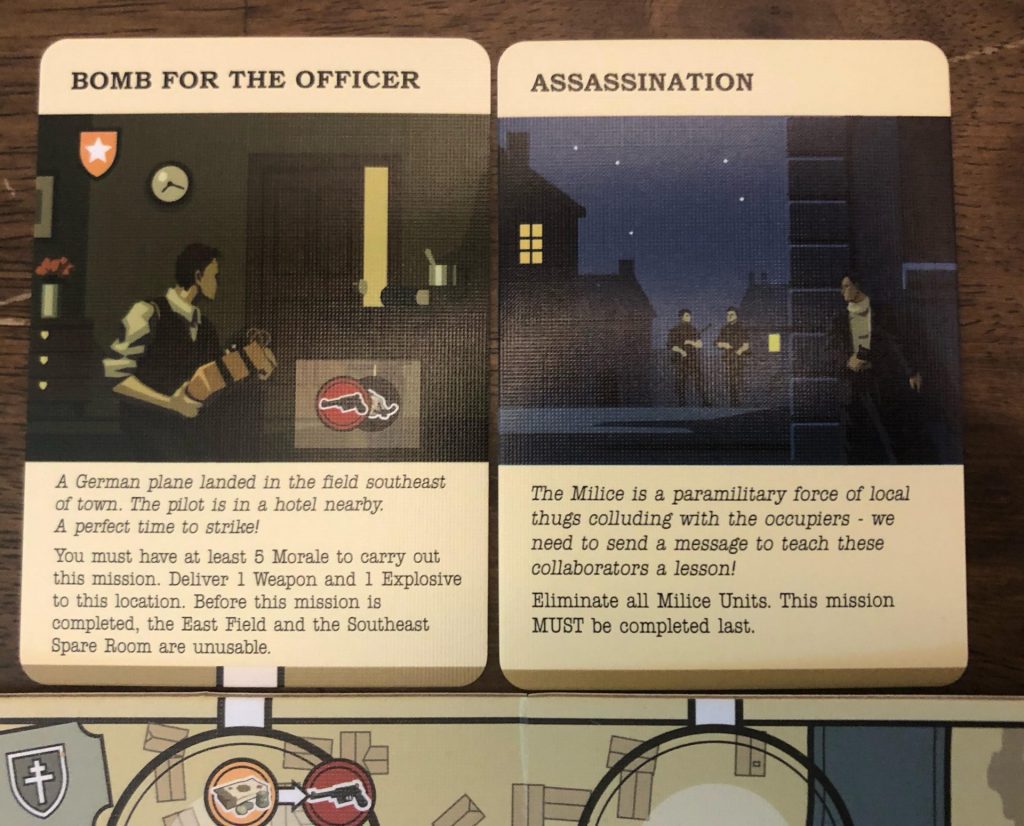
During a round, you’ll place your operatives on the map one by one. As in most worker placement games, each spot can only hold one pawn. The various locations on the map offer resources or unique actions that you’ll use to complete your missions, recruit new Maquis agents, defend against patrols, or otherwise survive.
To make any progress, you’ll need to pick up a few resources. There are four major types (Food, Money, Medicine, and Weapons) which are used consistently regardless of the mission. A few missions require specialized resources, such as Poison or Fake IDs, which can only be acquired through Spare Rooms. These are locations which are purchased with Money and then added to the board in one of the three available Spare Room slots. This nifty system allows you to tailor your available actions to the mission or even your playstyle.
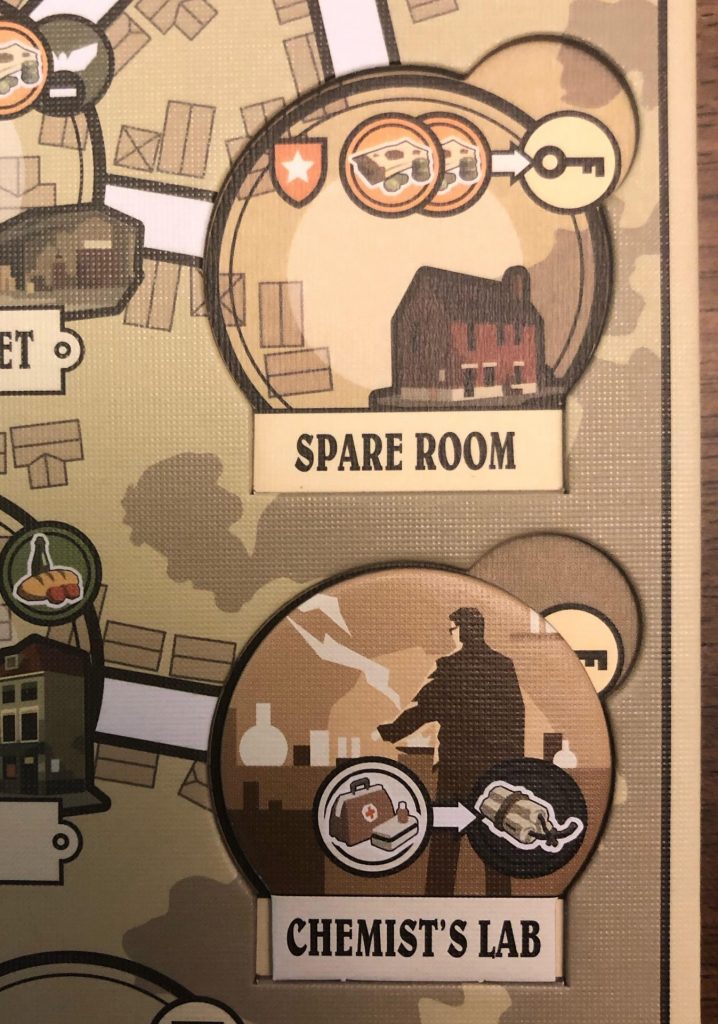
Keeping those resources is a little trickier. While a mission might require you to deliver, say, 2 Food to a specific location, you’ll find that this goal is at odds with spending that Food to hire new agents or improve Morale in the community. You might even need to sell that Food for quick Money to buy something you need right now. You’re always on the edge of disaster in Maquis, and every crumb and coin is crucial to the resistance.
After sending each agent, you’ll flip one of the Patrol cards to represent the appearance of the paramilitary forces known as the Milice. These cards have three locations listed on them: you’ll go through these locations in order (top to bottom) to determine where the Milice arrive. The Milice arrive at the first open location on the card; if no location is open, they’ll arrive at the first location occupied by a Maquis agent. When this happens, the Maquis agent is arrested: the meeple is removed from the board and cannot be re-recruited for the remainder of the game.
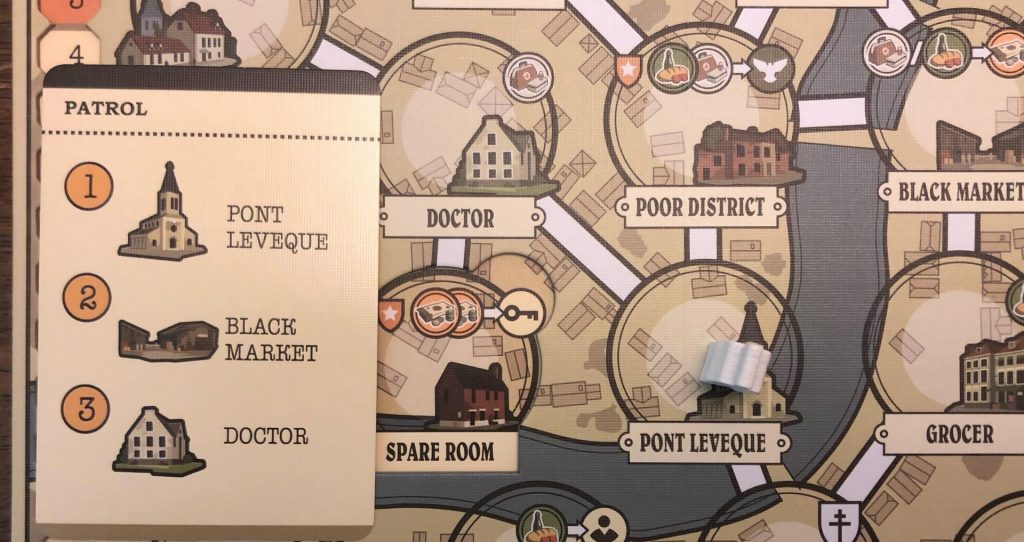
Arrests can also happen at the end of the round. Locations are connected to each other by paths and if a Maquis agent cannot reach the Safe House (because a Milice is blocking a location they must pass through) they will be arrested. It probably goes without saying, but if all available agents are arrested, the resistance is defeated and the game is lost.
There is a way to escape arrest, however. If you have a Weapon token available, you can spend it to eliminate a placed Milice. It won’t stop the Milice from capturing a Maquisard on the same location, but it might open up a path to let your agent(s) get back to the Safe House. It comes with a heavy cost, though. You may only do this once per round, and if you do you immediately lose one Morale. (Note that Morale drops at set intervals throughout play as well, with the game ending in defeat if it ever reaches zero.) Worse yet, the Milice pawn is replaced next round by a Soldier. Soldiers cannot be eliminated in this way, making it more difficult for your operatives to move around.

At the end of the round any uncaptured agents return to the Safe House, the enemy patrols head home, and the next round begins. In order to win, the player needs to complete both of their missions before the end of the 15th round.
Ultimately, you’ll want to focus on your missions in order to win the game. Broadly, these require you to either pick up and deliver certain resources (treating the Mission card as a location that must be visited to make the drop) or meet a condition. Some Missions can involve multiple deliveries, specific timing, or additional restrictions that apply until the mission has been completed. Missions feature a difficulty level, allowing you to tailor the game to your skill level, with the hardest missions offering a challenge for even veteran players. Moreover, there are various options included for tweaking the game to make it easier or harder.
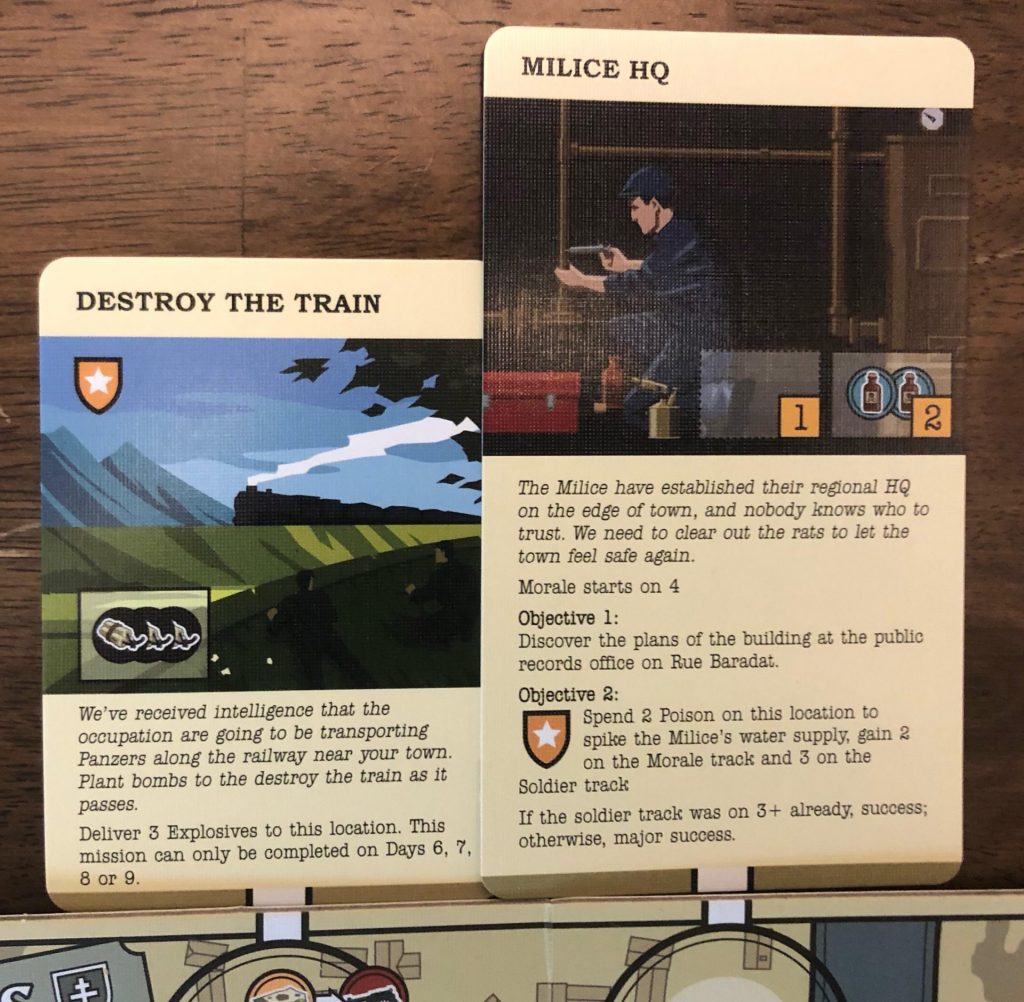
This Machine Kills Fascists
I first came to Maquis through the app version. While the app doesn’t have the best tutorial, once I learned how to play I fell in love with the game. When the second edition went to Kickstarter, I had absolutely no qualms about backing it. Maquis hits so many of my buttons: it’s quick and pacy while still providing an engaging puzzle. When I reviewed For Northwood! I remarked on Side Room’s skill with converting multiplayer-focused mechanics to solo-only games and Maquis is perhaps their best work in this regard.
In terms of gameplay, there are many subtleties to make even the small board feel large. My favorite spaces are the two Radio locations, where your agent can call in an airdrop of certain resources to pick up during the next round. The token(s) for the resources are placed in one of the two Field locations at the bottom of the board, where patrols never go, but of course the Radios themselves are located at the edges of the board so that the agent is at maximum risk. It’s not just where you place your agents, but when you place them that counts.
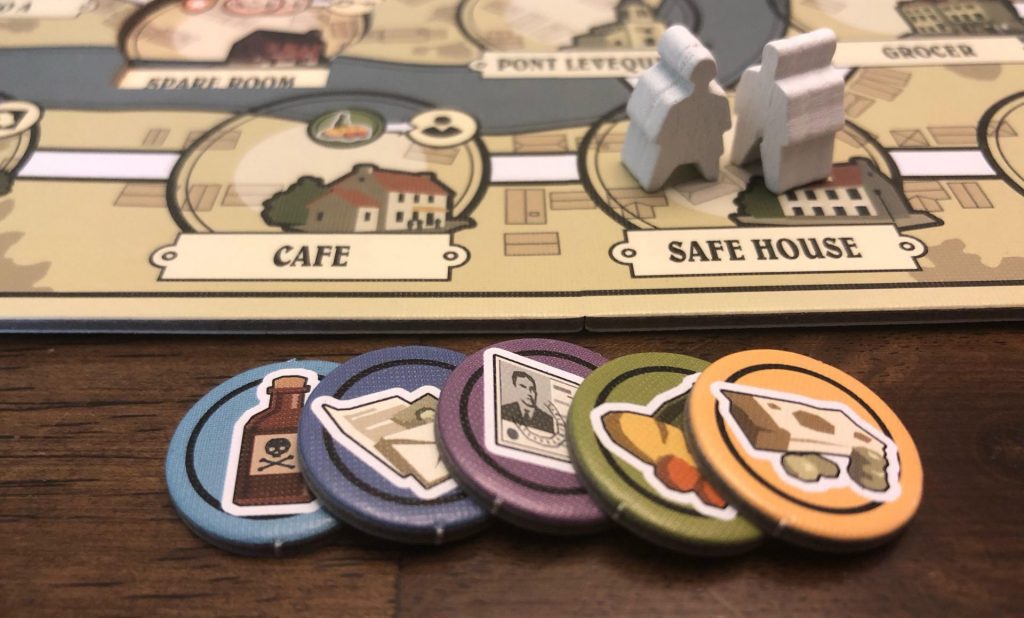
The empty spaces on the board add depth to the puzzle. They don’t do anything themselves, but they serve the absolutely crucial role of securing your paths home. They’re worth grabbing early in the round to prevent a single patrol from blocking all your escape routes, yet taking them too early means potentially missing out on the locations you actually want. Depending on how you’re faring, you may need to skip them entirely in an all-out bid to get as much done as possible. The gameplay itself is not complex, but it remains interesting play after play because of the smart decisions that went into this elegant design.
And the theme! I will admit that the theme of Maquis is not for everyone. It’s certainly grim, knowing what might have happened to actual Maquis agents once captured. The real-life atrocities committed by the Nazis and their sympathizers are obviously horrific and I do not judge anyone who does not want to see their inclusion in any game, let alone one as light and quick as Maquis.
For me, though, Maquis perfectly captures the feeling of a clandestine resistance. Each time a patrol appears you can feel the iron fist descending with a thump. Arrests are painful, representing not only the loss of this turn’s effort but the longer-term loss of agency. (The app doubles down on this by giving each Maquis agent a portrait and a name, making them feel more like actual people.) The ticking loss of Morale, caused by the strain of occupation and the unbearable burden of taking a life, carries tremendous weight as you inch ever closer to defeat.
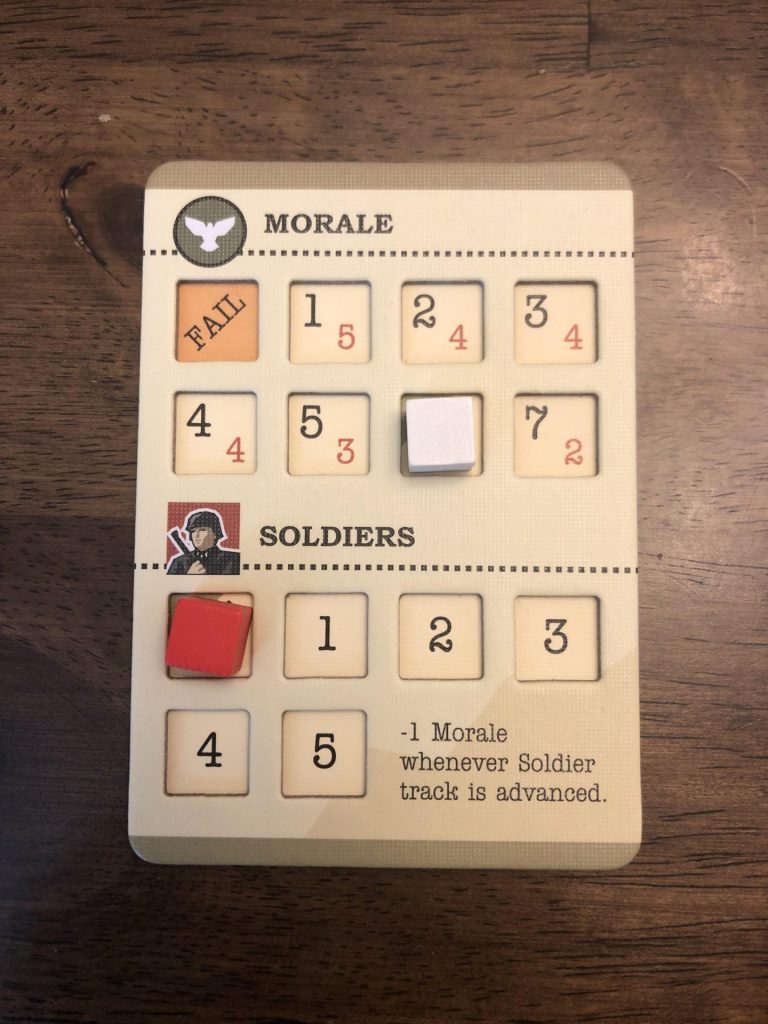
The art and graphic design for Maquis by Ilya Baranovsky and Mark Tuck does an excellent job of suffusing the game with its theme. The artwork has a curious style I can’t quite identify that somehow evokes period-appropriate propaganda without actually reflecting it. That tone helps bring the game to life, making you feel as though you’re looking at a contraband poster in a hidden basement on the wrong side of town.
Having started with the app, I will say that the physical version of Maquis has a few quirks that I didn’t expect. For one, the Maquis meeples are a bit strangely shaped, particularly in the legs. The day tracker on the board is also a tad confusing: you begin the game at START and advance from there, making your first turn effectively Day Zero of your 15-day timeline. And the oversized 3-star mission cards don’t quite line up with the board the way the normal cards do, which can be slightly annoying at times. None of these have a big impact on gameplay, so they’re easy enough to ignore once you’re used to the game.
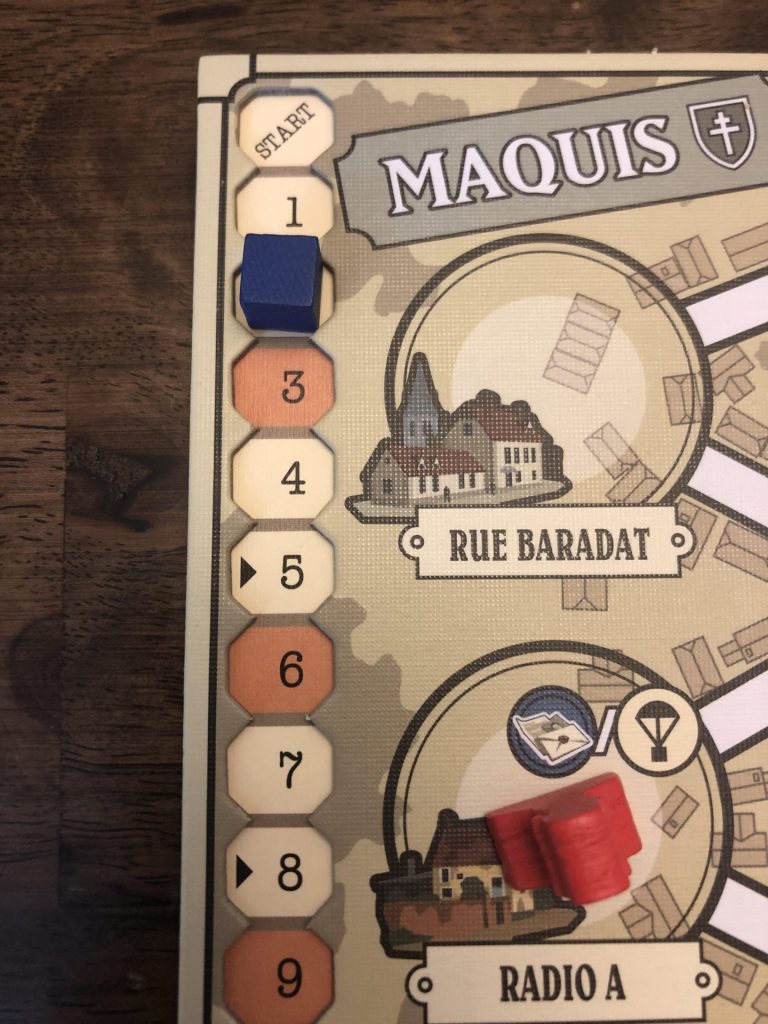
A bigger problem for me is that Maquis requires an awful lot of shuffling. There are 3-5 Patrol cards drawn every round and only 10 cards in the deck. The game is intentionally designed so that you can predict, with some regularly at least, the precise location of the upcoming patrols. However, that means you’ll cycle through the deck sometimes every other turn. Keep in mind that a turn typically takes only a minute or two and you’ll see how quickly that adds up. As I mentioned in my Harsh Shadows review, I have a pet peeve about shuffling small decks of cards so frequently. Chances are good that it won’t bother most reasonable people, but I find it a touch tedious. The app’s instantaneous shuffling (and its ability to calculate the odds of each patrol location) does give it an advantage here over the physical version.
Does that stop me from recommending Maquis? Absolutely not! Maquis is an incredible game, a great blend of mechanics and theme that hits on all cylinders. Its few flaws are minor and forgivable. At the very least, it’s worth looking at the app for an introduction to the game. Personally, I love having both options: the app for when I need a quick game on the go and the physical game for when I’m in the mood to attempt a few missions over the course of an evening. App or tabletop, victory or defeat, I always enjoy sitting down to a game of Maquis.


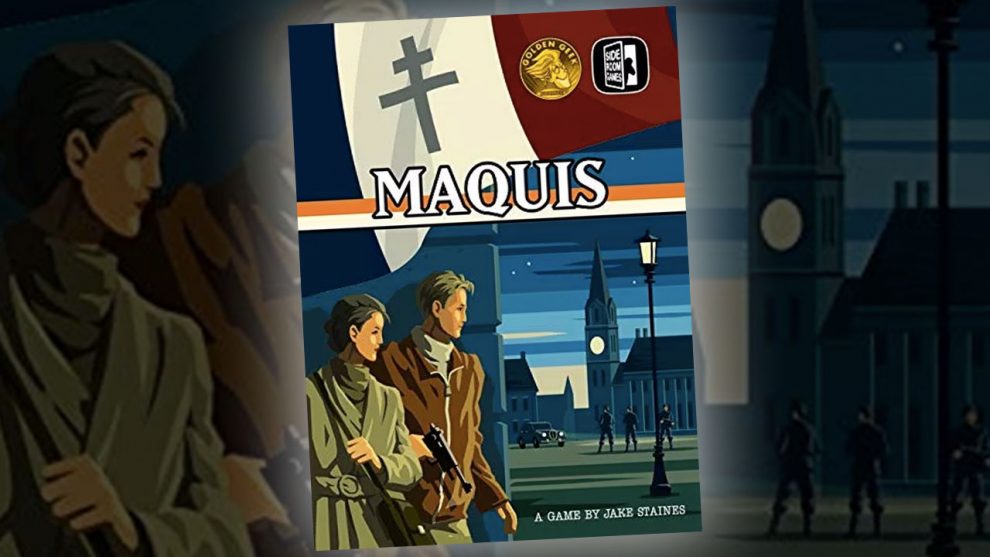




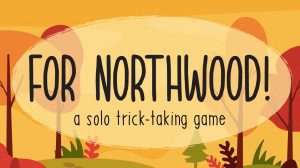




Add Comment